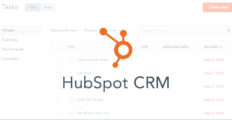AI in CRM: Customer Relationship Management (CRM) systems are used by 90% of businesses with more than ten employees but only 50% of companies with fewer than ten workers.
Even though these tools have become a big part of how businesses make sales, the improvements in AI technology affect this answer. As CRM tools get smarter, they give more accurate information about sales and help companies make better sales decisions. CRM systems need AI technology more and more because there is more unorganized data, and customer relationships and processes are getting more complicated.
However, Freshworks found that just 12% of CRM customers employ an AI-powered CRM application. Many people think that AI-powered tools are too expensive or useless for what they cost now. So, we still need more time to see how AI affects the sales process.
This article will discuss how investing in AI is essential for driving organizational growth and success.

What to look for in AI-powered CRM interface tools?
When picking an AI-powered CRM integration system, there are a few essential things to consider. Depending on your business needs, these features can be different, but there are a few that you should put first when making your choice:
1. Automation
Automation tools are a big part of making things easier and saving time. Automation is a standard practice in many businesses because it can do specific jobs faster and more accurately than people.
Advances in AI have made it possible to automate very complicated processes including content automation, such as creating emails, reports and presentations. When picking tools, give the most weight to those that can automatically do things like data entry, lead scoring, and follow-ups.
2. Machine learning
Machine learning (ML) is at the forefront of current AI uses in the business world.
Its main idea is to enable automated systems to adapt to changing surroundings in a productive and efficient way by using pattern recognition and inference instead of strict programming or specific rules. New tools are emerging such as that by ProAI using adaptive ML techniques to continuously learn about a company over time.
This method allows for combining different kinds of customer data, which gives businesses helpful information about how customers make decisions.
3. Analytical forecasting
Explore new CRM systems that use analytical techniques to predict customer behavior and market trends based on data.
Use analytical forecasting to make better choices and allocate resources, allowing for practical actions at all company levels, such as personalized customer interactions.
With the help of analytical forecasting, you can stay competitive with intelligent tactics and great customer experiences.
4. Expandability
When figuring out if the system suits you, you must give expansion the most weight. Ensure it can easily handle your growing number of customers and growing amounts of info.
Successfully avoiding transaction fraud, evaluating credit risk, and identifying fraud are some areas where the chosen AI technology will prove its worth.
5. Analysis of sentiments
AI mood analysis is very important for businesses because it helps them determine how customers feel about their products and services.
This feature lets customer service and sales agents recognize feelings like anger and happiness across different modes of contact, such as phone, live chat, email, and social media.
AI sentiment analysis helps improve the customer experience and decision-making processes by giving helpful information about how customers feel about goods and brands.
What are some uses of AI in CRM?
Interface.ai says that 86% of sales departments are unhappy with their CRM. This is because processes involving physical jobs or CRM tools take a lot of work to use.
So, adding AI could help businesses improve their CRM processes and lessen the need for people to help with chores like entering data by hand. So, workers can spend more time on tasks that add more value and work more efficiently. Here are the most common ways to use AI in CRM
1. Lead Qualifications
It can take time to effectively qualify leads through various marketing platforms. AI-powered CRM systems can help by allowing leads automatically, saving time, and improving the sales cycle.
One of the biggest benefits is that lead scoring can be done automatically. This makes it easy for businesses to find leads likely to turn into sales and focus their sales efforts more efficiently. This makes the most of marketing spending and makes information handling better overall.
2. Getting email content into CRM effectively
Using AI to read email content and put it into CRM is a great way to automate sales and marketing tasks. Important information from new emails is taken out and put into the CRM system during this process.
Using a mix of NLP, machine learning, and data interaction tools is important. The result is a system that is accurate, up-to-date, and easy for sales and marketing teams to use. This makes operations run more smoothly. Additionally, adhering to DMARC policy ensures heightened email security and authenticity in the process.
3. Personalized experience
Personalization is a key factor in how well a business does. CRM tools are essential for gathering information about customers so that we can better understand them.
CRMs that use AI look at this data to determine how customers act, leading to personalized experiences.
AI-powered personalization has benefits like better customer experiences, more income, less customer turnover, and data-driven insights.
4. Chatbots and virtual assistance
Two main types of virtual helpers use CRM data:
- In-Office Tasks: Virtual assistants can handle simple in-office tasks like setting up meetings, taking notes, and sending reminders in a CRM system.
- Intelligent Call Routing: AI chatbots can understand natural language questions for customer categories and handle customer calls to help call centers with easy customer chores. This is made possible by CRM data.
5. Lead scoring and sales forecasts based on past behavior
AI-integrated CRM makes forecasts more accurate by analyzing data and giving valuable sales insights. The sales team can use these predictions to improve how they do things.
AI-powered CRM also gives detailed customer information, making it easier to find focused leads and saving time while increasing sales.
Customers are happy with AI-powered systems and tools for lead scoring, citing benefits like better lead selection, higher sales productivity, and a better return on investment (ROI) for marketing.
6. Data
Cleaning up data
Customer data can have a lot of unusual items, copies, and other mistakes, making it hard to make accurate predictions. Dun&Bradstreet says that 92% of the data in CRM systems is not full, 18% of it is copied, and 70% of it goes out of date every year. An AI-integrated CRM system can do the following to improve the quality of decisions:
- Find possible problems.
- Get rid of the similar info.
- Tell the people to fix their mistakes.
- Look in other systems for info that is not full.
- Make suggestions for how to change info that might be old.
Data entry is one of the most repetitive and boring jobs in a business, but AI takes care of it so that workers can work on more important tasks.
Key CRM AI Benefits
AI-powered CRM offers personalized suggestions, personalized marketing messaging, and enhanced data processing. Explore these benefits in detail:
1. Identify and fix problems
By avoiding difficulties, AI improves customer interactions. AI helps companies swiftly handle customer complaints and product faults by processing and analyzing massive consumer interaction data. This proactive strategy helps companies enhance their services and client relationships.
2. Effectively managing big data
CRM tools collect data from several platforms to provide organizations with complete customer information. As data quantities expand, insights become harder to find. AI-CRM integration streamlines huge dataset handling. Organizations may now use AI to analyze the huge data created in the e-commerce sales funnel.
3. Reducing complaint resolution time
Improving customer interactions requires brands to reduce customer care response time. Automated chatbots and NLP-backed systems let customer support employees handle most concerns.
4. Effective client service
AI’s capacity to handle many consumer questions allows a smaller customer support team to intervene when needed, speeding up resolutions and improving customer satisfaction. AI-powered technology allows businesses to give individualized service to more customers across time and space.
Wrapping it up
Artificial intelligence (AI) has the capability to increase companies’ customer relationship management (CRM) activities by offering precise insights into client requirements, hence facilitating a deeper understanding of customers. The implementation of AI-driven customer relationship management (CRM) systems has the potential to enhance the productivity of your sales staff, enabling them to allocate more attention to important aspects that contribute to the development of solid relationships with clients.























Leave a comment!